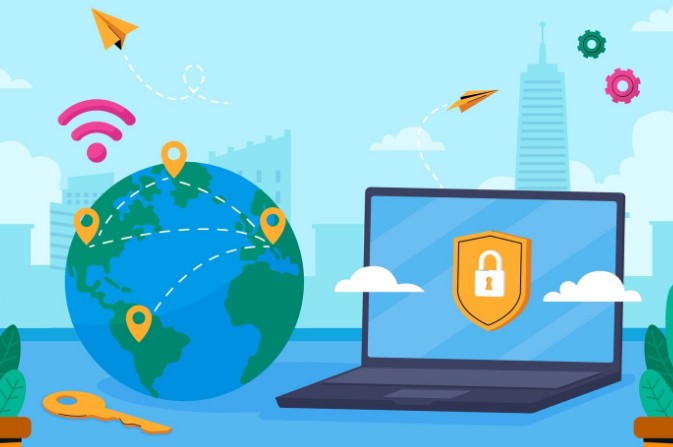🔒 Cyber Security Today

Cyber Security Today, cyber security has become one of the most critical aspects of our personal and professional lives. With billions of people using the internet daily, the risks of cyber threa
ts such as hacking, identity theft, data breaches, and ransomware have increased dramatically. Cyber security today is no longer just a concern for IT professionals — it affects everyone who owns a smartphone, laptop, or any internet-connected device.
What is Cyber Security?
Cyber security refers to the practice of protecting systems, networks, programs, and data from digital attacks. These attacks usually aim to access, change, or destroy sensitive information, interrupt normal business processes, or demand money through ransomware.
The main goals of cyber security can be summarized as the CIA Triad:
-
Confidentiality – Keeping data private and accessible only to authorized people.
-
Integrity – Ensuring data is accurate and not altered by unauthorized parties.
-
Availability – Making sure systems and data are available when needed.
Current Cyber Security Threats in 2025

Cybercrime has evolved over time, and today we see more sophisticated and damaging attacks. Below are some of the biggest cyber threats today:
1. Ransomware Attacks
Hackers lock a user’s data and demand payment to release it. This has become a billion-dollar industry worldwide.
2. Phishing Scams
Fraudulent emails or messages trick people into giving away personal details like passwords or banking information.
3. Identity Theft
Cybercriminals steal personal data such as Aadhaar, PAN, or credit card details to impersonate individuals and commit fraud.
4. Cloud Security Risks
With more businesses moving to cloud platforms, cybercriminals target cloud servers for large-scale data breaches.
5. AI-Powered Cyber Attacks
Artificial Intelligence is now being misused to create deepfakes, bypass security systems, and automate hacking attempts.
Importance of Cyber Security Today
Cyber security is not just about protecting data — it’s about maintaining trust, reputation, and safety in the digital world.
-
For Individuals: Protects personal photos, banking details, and social media accounts.
-
For Businesses: Ensures customer trust, prevents financial losses, and avoids legal issues.
-
For Governments: Protects national security, defense systems, and citizens’ data.
Best Practices for Strong Cyber Security
To protect against threats, individuals and organizations should adopt the following practices:
-
Use Strong Passwords
-
Create unique passwords with letters, numbers, and symbols.
-
Avoid using birthdates or common words.
-
-
Enable Two-Factor Authentication (2FA)
-
Adds an extra layer of protection by requiring OTPs or authentication apps.
-
-
Keep Software Updated
-
Regular updates fix vulnerabilities that hackers exploit.
-
-
Be Aware of Phishing Attempts
-
Avoid clicking suspicious links or downloading attachments from unknown emails.
-
-
Use Antivirus and Firewalls
-
Essential for protecting devices from malware and spyware.
-
-
Secure Wi-Fi Networks
-
Always use strong encryption and avoid public Wi-Fi for sensitive activities.
-
-
Backup Data Regularly
-
Store important files on external drives or cloud storage to prevent data loss.
-
Emerging Trends in Cyber Security (2025)
As technology advances, cyber security must evolve too. Some of the major trends shaping today’s landscape include:
-
Zero Trust Security: Assumes no user or device is trustworthy by default.
-
AI & Machine Learning Defense: Detects unusual patterns and predicts cyber-attacks before they happen.
-
Cybersecurity for IoT Devices: Protecting smart homes, cars, and wearables from hacking attempts.
-
Quantum Cryptography: A future-proof way to secure data using quantum mechanics.
-
Cloud Security Enhancement: Advanced tools to prevent data leaks and unauthorized access.
🖼️ [Insert Image: Futuristic AI-driven cyber defense system]
Role of Cyber Security in Daily Life
Cyber security is part of our everyday activities, even if we don’t notice it.
-
Online Banking: Secure encryption keeps financial transactions safe.
-
E-commerce: Protects customer details during online shopping.
-
Social Media: Ensures privacy and prevents unauthorized access.
-
Work from Home: VPNs and secure apps safeguard office data.
🖼️ [Insert Image: Person using laptop with padlock security symbol on screen]
Conclusion
Cyber security today is one of the most important aspects of our digital lives. With the rise of cybercrime, it is no longer optional — it is a necessity. Individuals, businesses, and governments must take proactive steps to secure their data and systems.